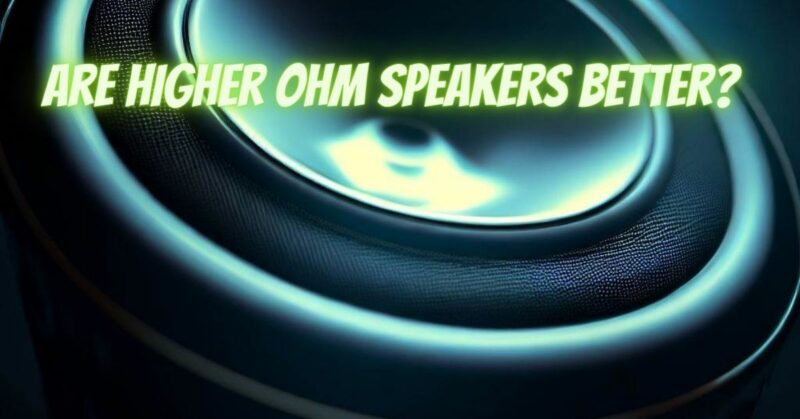In the realm of audio enthusiasts and equipment aficionados, the debate over whether higher ohm speakers are inherently “better” has persisted for years. The belief that higher ohm speakers offer superior sound quality or performance has led to a range of discussions. In this article, we’ll delve into the nuances of this topic, exploring the misconceptions, the factors at play, and why the concept of “better” should be approached with a critical mindset.
Understanding Ohms in Speakers
Before diving into the analysis, let’s establish a clear understanding of ohms in the context of speakers. Impedance, measured in ohms (Ω), is the electrical resistance that a speaker’s voice coil presents to the flow of electrical current from the amplifier. Different impedance levels influence power distribution, amplifier compatibility, and how efficiently the speaker converts electrical energy into sound.
Dispelling the Myth of “Better”
The notion that higher ohm speakers are categorically “better” than lower ohm speakers is a misconception. Sound quality and speaker performance depend on a multitude of factors beyond impedance alone. Let’s explore why this belief is often misleading:
- Sound Quality is Multifaceted: Sound quality is influenced by various factors, including speaker design, driver quality, cabinet construction, crossover technology, and room acoustics. Impedance is just one piece of the puzzle and doesn’t dictate overall sound quality.
- Amplifier Compatibility: While higher ohm speakers might draw less current from amplifiers and can be more compatible with certain amplifier designs, this doesn’t automatically equate to “better” sound quality. Compatibility does not inherently translate to improved sonic performance.
- Power Handling and Efficiency: Higher ohm speakers might handle power differently from lower ohm speakers, but this doesn’t necessarily result in better sound quality. The focus should be on achieving the desired sound characteristics, not just maximizing power handling.
- Personal Preference: Sound quality is subjective and varies from person to person. What one listener considers “better,” another might not. Individual preferences, listening environments, and musical genres all play a role in determining what sounds best to each listener.
Factors Influencing Sound Quality
To truly understand sound quality, consider these critical factors:
- Driver Quality: The quality of the speaker’s drivers, including woofers, tweeters, and mid-range drivers, has a significant impact on sound quality. High-quality drivers lead to more accurate sound reproduction.
- Cabinet Design: The design of the speaker’s cabinet influences resonance, dispersion, and imaging. A well-designed cabinet enhances the overall listening experience.
- Crossover Technology: The crossover network determines how different drivers work together. A well-designed crossover contributes to seamless transitions between frequencies.
- Room Acoustics: The listening environment greatly affects sound quality. Factors such as room size, furnishings, and acoustic treatments play a vital role in the overall audio experience.
The belief that higher ohm speakers are inherently “better” is a misunderstanding that oversimplifies the complex nature of sound quality. Sound reproduction involves a synergy of various elements, and impedance is just one among many factors. To evaluate speaker quality, consider the entire package, including driver quality, cabinet design, crossover technology, and your individual listening preferences. Remember that there is no one-size-fits-all answer to what sounds “better.” The pursuit of audio excellence is a personal journey that involves a deep understanding of the interplay between technology, acoustics, and your unique preferences.


